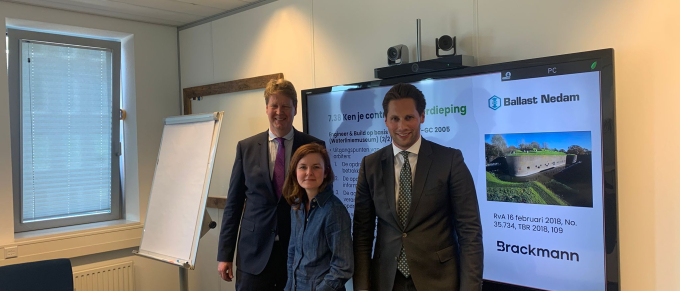News & Events
Stay informed with the latest news in area development, construction and procurement law. Explore updates, insights, and events we are involved in.

Procurement: What – How? | Submission of the European Single Procurement Document (ESPD)
Who must submit a European Single Procurement Document (ESPD)? At a minimum, the tenderer themselves. This seems obvious: the contracting authority needs to verify whether the tenderer meets the exclusion grounds and suitability criteria. Moreover, the ESPD contains essential information about the party that will become the contractor if the contract is awarded.

Procurement: What – How? | Standstill period in tenders applies only to bidders
Who must submit a European Single Procurement Document (ESPD)? At a minimum, the tenderer themselves. This seems obvious: the contracting authority needs to verify whether the tenderer meets the exclusion grounds and suitability criteria. Moreover, the ESPD contains essential information about the party that will become the contractor if the contract is awarded.

Alexander Klein Hofmeijer in ENTRNCE webinar on energy contracts and procurement alternatives
How can public organizations handle expiring energy contracts without immediately launching a new procurement procedure? In this ENTRNCE webinar, Alexander Klein Hofmeijer shares his legal insights into alternative procurement routes. Many public entities assume a new tender is the only option—but that isn’t always the case.

Procurement: What - How? | Freedom of choice in pricing
When submitting a price offer, bidders must comply with the contracting authority’s requirements. This means they must include all components that belong in the price. However, when bidders are given the option to determine how to fulfill a part of the scope themselves, the price for that part can vary in different ways. A practical example illustrates how freedom of choice within the scope led to a dispute over the validity of a bid.

Course on design responsibility at Ballast Nedam
Our specialists Gert Weerheim, Daan Timmerman, and Ines Blomsma delivered a course on design responsibility at Ballast Nedam in Nieuwegein. During the course, the six key success factors for designing contractors were discussed. Read on for the essential insights.

Brackmann continues growth with the appointment of Ines Blomsma as of June 1, 2025
As of June 1, 2025, Mr. Ines Blomsma will join Brackmann as an attorney. With her extensive experience in litigation and a strong focus on construction and real estate law, Brackmann is further expanding its construction practice with Ines. She previously worked at, among others, Pels Rijcken, Loyens & Loeff, and Köster Advocaten. We spoke with her about her decision to join Brackmann and her vision for the profession.

From lecture hall to office: Cato on her first months at Brackmann
Cato Everhardt started earlier this year as a legal assistant at Brackmann. Since then, she has been involved in case files, supporting the secretariat, and learning extensively on the job. We look back with Cato on her initial period: adjusting to the rhythm and moments when she thought, “Yes, this is where I belong.”

The UAV-GC 2025 through the lens of design responsibility
An article by Gert Weerheim, partner and attorney at Brackmann, was recently published in TBR (Journal for Construction Law), offering a perspective on the UAV-GC 2025 from the viewpoint of design responsibility.

Blog | Procurement: What - How? (issue week 20)
'AVR Case at the Court of Justice: Scrutiny of Supervision Criteria'
Joris Bax, lawyer at Brackmann, shares insights and thoughts on current topics in procurement and construction law in his blog "Procurement: What - How?".

BLOG | Special sector company or not? The new ‘Collective Heat Act’ as an example
Blog series 'Special sectors require a specific approach (Issue 4)', written by Mr. Pieter Smid, with insights on public procurement under Part 3 of the Public Procurement Act.